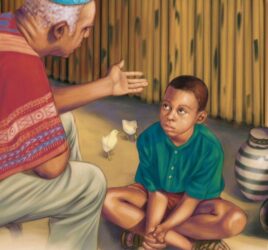
Know Yourself Well, or Else! Profile for an Effective International Church Leader (Part 3)
No matter where you go, you take yourself, your whole self, with you! You can never get away from all you are, the good the bad, and the ugly. Every IC pastor and leader brings inner strengths, weaknesses and vulnerabilities, and personal history that must be honestly understood and addressed. The less you know about yourself, the more your ministry will be shaped in unhelpful ways. And probably, you may not even see it… but others will!
Unresolved traumas, hurts, fears, habits, resentments, and all the ways sin is a part of who you are, will shape how you relate to others… and to God. We are all sinners who have been sinned against. Psychological and emotional realities need to be maturely identified and weaknesses addressed. Unresolved deep emotions can feed both legalism, and laissez-faire disengagement. Pastors especially can be driven towards controlling and coercive behaviours, judgementalism, and an unhelpful selectivity as to what matters and what does not. Ignorance of our deeper realities gives opportunity for exploitation by ungodly spirits.
However, as many can readily testify, the key to maturity and effectiveness is in knowing oneself well. This makes all the difference. The Word and Spirit, a loving Christian community, and whatever other life experiences God wants to utilize, will bring liberation and maturity over time.
So, IC pastors and other leaders need to be teachable, insightful regarding their own baggage, and have a real capacity for flexibility, and be a genuine people-person (even if an introvert!)
And lastly, in a world of rapidly developing technology upon which we depend, and the drift towards technocracy, effective IC leaders need to be wise and competent in managing this aspect of church life and ministry.
- A teachable, lifelong learner, with the humility needed to accept correction and change:
- No IC pastor or leader arrives in the IC world already equipped for the job. In all facets of IC leadership of church life and mission, the IC pastor must have a serious commitment to life-long learning; including an openness to make profound changes in perspectives and practices as a result: a listener rather than a talker (actively creates spaces for listening), a team player rather than pastor-centred, a humble recognition that s/he still has much to learn.
- Each item below will require much learning, a teachable character willing to learn from others, and a humble willingness to change when necessary.
- If genuine, these qualities will be evidenced in a leader/pastor’s life long before s/he arrives in the IC scene.
- A sincere commitment to life-long learning will produce a willingness to be connected to an IC network beyond the local context.
- Models follower-ship when not actually required to provide leadership.
In terms of a teachable character we have emphasized humility; should more be included?
What do you find most challenging in being teachable?
- Understands and owns his/her personal baggage of brokenness, vulnerabilities, flaws and limitations, and takes responsibility for his/her soul:
- IC pastors and other leaders survive and thrive by being very aware of the emotional and psychological baggage they bring with them. They know their vulnerabilities and sensitivities and have learned to manage them well. They have already established habits of self-reflection and have addressed the inner issues well enough to engage in ministry. They have a growing insight as to how their own baggage impacts their ministries for good and for ill. They are aware of the resources available to enable them to continue to heal in these areas of brokenness.
- They have the capacity to address the ways changing contexts may stimulate different expressions of this baggage.
- All leaders have their thorns in the flesh. Effective leadership only develops as leaders face their personal baggage, the inner struggles and “demons” that never seem to go away.
- IC leaders must give due importance proactively to the practices and disciplines of personal growth, character development, maturation, relationship with God, and increasing in wisdom. Honesty about one’s inadequacies is fundamental. Cultural insight and theological breadth are essential here as so many presume too much in these areas.
- Appreciates the value of someone to travel with them through learning about and the management of self; such as a guide, counsellor, mentor, coach, spiritual director, close friend, or accountability partner.
- Has a growing resilience and inner strength through attention to personal brokenness, vulnerabilities, flaws and limitations.
- For a brief discussion on the healthy tension between the ideals of this Profile and the realities of human brokenness and flaws, see “OCD and Other Realities.” at http://micn.org/ocd-and-other-realities/
How important or necessary is knowing oneself for the IC pastor?
What does rigorous soul-care responsibility look like for you?
- Demonstrated freedom to be flexible and adaptable, and able to function well with unpredictability:
- Able to be comfortable with the unpredictable, the high level of fluidity, the recurring disruption to plans, the recurring disappointments of good people moving on, the sense and the reality that everything could change very quickly.
- Able to work with those who plan well ahead and those who plan at the last minute.
- Able to incorporate diverse ecclesiastical practices in the IC.
- Diversity in thinking and practice for church life and mission. Not constrained by one’s own denominational idiosyncrasies, etc. See Centred-set Thinking.
- Capacity to be creative in developing systems, procedures and structures for the IC. In the previous experience of many IC pastors much of this is a given but, in the IC, often even the most basic organizational details are in need of design. Open to unique structures; suspicious of merely duplicating working models from elsewhere.
- The creativity and theological grounded-ness to turn these challenges into opportunities.
- Able to turn “distractions” into pastoral and missional opportunities.
What are the primary capacities that enable IC Pastors to function well when everything changes at the last minute?
If there was a gift called “copability” how would you develop yours?
- A people-person with a pastoral and missional heart, strong devotion to marriage and family, and skilled relationally with strengths in facilitating a unified church community:
- Growing emotional intelligence for individuals as well as large and small groups.
- Strength in supporting, equipping and releasing envisioned people.
- Able to facilitate a community of mutuality, giving and receiving, compassion (especially for the least), and listening to one another as foundational to loving one another.
- As appropriate, knows how to work with a both/and mind-set.
- Evidence of grace, emotional intelligence, sacrifice, kindness, wisdom, etc, in how the pastor or other leader loves his/her marriage and family. What level of correlation is there between the pastor’s family community and church community?
- Functions consistently as a peace-maker with a strong spirit of reconciliation; a bridge builder of people, organizations, churches, and other groupings. Able to work with unresolved differences of opinion. Able to initiate and facilitate dialogue/conversations between those of differing view-points.
- Able to facilitate the integration of multiple ethnicities into the community life of serving one another and working together in the missio Dei. For those working cross-culturally with just one ethnic group, such as many missionaries, this difference needs to be well understood. There is a difference between cross-cultural and multi-cultural engagement.
- Considerable multi-cultural capacity in all the above of # 12. See # 5 for further comment on culture.
How would you describe this complex mix of qualities needed for effective facilitation of a unified church community?
What strengths do you need to increase to be an effective peace-maker and a reconciling presence?
- Reasonably conversant with the ways technology has become a useful tool in ministry and able to make effective use of IT options:
- Enough tech-savvy to adapt to and work with the constantly changing world of IT.
- Appreciates the limits of technology such that wise decisions can be made as to when and how technology should be utilized. Understands how technology can be good and can be not essential.
- Knows how to keep the priorities on people and not technological possibilities. Knows how to prevent technology from distracting people from the priorities of loving one another, the ministries with the church, and the mission beyond the church into God’s world.
- Able to address the security issues of IT.
- Aware of the rise of Artificial Intelligence (AI) and the potential of AI to question what it means to be human.
What do you have to say about developing technology and the IC pastor?
In what ways do you over or under utilize technology?
We have looked at the big-picture direction God has laid out for us in Scripture. We have turned in on ourselves to explore just how well we need to know ourselves. Next, in Part 4, we will look out beyond ourselves to the world, the context, in which we seek to serve the IC.



